
Arquivo para a ‘Cognition’ Categoria
Being and Contemplation
The thinker Byung-Chul Han developed the themes of Hannah Arendt Vita Activa and Vita Contemplativa in his book “A society of Bournout”, where he reveals that “the loss of the contemplative capacity is in correspondence with the absolutization of the vita activa – which measure to the hysteria and nervousness of the modern society of action”, and this leads to tiredness, depression, self-exploitation and Burnout.
Arendt Vita Activa and Vita Contemplativa in his book “A society of Bournout”, where he reveals that “the loss of the contemplative capacity is in correspondence with the absolutization of the vita activa – which measure to the hysteria and nervousness of the modern society of action”, and this leads to tiredness, depression, self-exploitation and Burnout.
According to the Korean-German thinker, current life has led to the “imperative of work, which degrades the person into animal laborans”, which makes him lose the “world” and “time”. new “the contemplative vita in your bosom” and “put yourself at your service again” (O Aroma do tempo. A philosophical essay on the art of delay, 2009).
Despite this loss, there is a renewed interest in spirituality in Western civilization, but it does not consider traditional religions more important, which occurs in the sphere of a phenomenon called “mindfulness”, linked to neurosciences and in health care, education and business.
There is no deeper meaning in this relationship that reaches the divine, the superhuman or the beyond-human, it turns to what Peter Sloterdijk calls “the exercise society”, without the possibility of a true spirituality, or a despiritualized asceticism.
Hannah Arendt had touched on the problem lightly, it must be remembered that her thesis was on “Love in St. Augustin” without the help of the divine it does so without success, it remains hidden.
“With the title Vita contemplativa, that world in which it was originally located should not be reconjured. It is linked to that experience of being, according to which the beautiful and the perfect is Immutable and Imperishable and withdraws from any and all human use” (HAN, p. 35), although for the author the contemplative capacity is not necessarily linked to the imperishable Being (p. 36).
The concept of what the soul is was treated by Saint Justin, in the second century of the Christian era, before becoming a Christian he had approached the Stoics, but they did not consider it important to know God, then he approached the Pythagoreans and had to dedicate himself to numbers and music, and finally it was Plato’s disciples who thought as much about corporeal things as about ideas, but the key problem that distanced him was the question of the “soul” and is in his “Dialogue with Trypho”.
For older Christians (Catholic, Orthodox and Eastern) Eucharistic Adoration is the greatest contemplation, because God makes himself a piece of bread, a consecrated host.
Han, Byung-Chul Sociedade do cansaço. tradução de Enio Paulo Giachini. – Petropolis, RJ: Vozes, 2015.
The human and divine ascension
There are many exercises and forms that promise asceticism, ways of maintaining physical and mental energies are useful and important, but the spiritual ascent, which is the source of true asceticism, requires moral, ethical, personal and collective training that puts us in a virtuous circle.
of maintaining physical and mental energies are useful and important, but the spiritual ascent, which is the source of true asceticism, requires moral, ethical, personal and collective training that puts us in a virtuous circle.
When criticizing modern society, as a society of fatigue, Byung Chul Han reminds us that active life must be complemented with a contemplative life, which does not mean looking at infinity or the sky, it is meditation and the collective exercise of including the Another is knowing how to listen from an inner emptiness, or, as philosophy thinks, a phenomenological epoché.
He introduces contemplation as: “If sleep is the high point of physical rest, deep boredom is the high point of spiritual rest. Pure restlessness generates nothing new” (Han, 2015) and then defines it as: “Modern Cartesian doubt dissolves astonishment. The contemplative capacity is not necessarily linked to being imperishable. Precisely the oscillating, the inapparent or the elusive are only open to a deep, contemplative attention” (idem), therefore it is not a tactical exercise but a “astonishment”.
We say that it is phenomenological because of what follows the definition: “In the contemplative state, in a way, we go out of ourselves, diving into things”, this reminds Husserl “returns to the things themselves” without pre-definitions or pre-concepts, a true epoché .
After the astonishment, rest: “Without this contemplative recollection, the gaze wanders restlessly from here to there and brings nothing to manifest. But art is an “expressive action” (Ibid.), and without it our civilization, he says, quoting Nietzsche: “For lack of rest, our civilization is heading towards a new barbarism. At no other time were the active, that is, the restless, worth so much.”
This restlessness proves the wars, the most atrocious political disputes, mockery instead of dialogue and the careful analysis of social proposals and needs, there is no “rest” for this to be done.
The divine ascension, after the Christian asceticism that comes to passion and death, our civilization seems to go through this as a whole, angels appear who ask the disciples who are looking to heaven (Acts 1, 10-11): “… heaven as Jesus ascended. Then two men dressed in white appeared, who said to them, “Men of Galilee, why do you stand here looking up at the sky? This Jesus who was taken to heaven for you will come in the same way as you saw him leave for heaven”, they stopped a moment before “amazement” and “rest”.
The barbarism of the pandemic, the war and a food shortage that is announced demands “astonishment”, accept that the mystery exists and that the universe had an origin.
HAN, B.-C. (2015) A Sociedade do Cansaço. Brazil, Petrópolis: Vozes. (pdf)
Being, interpretation and dialogue
The essential concept of philosophical hermeneutics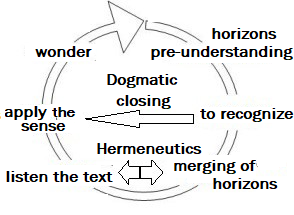 developed by Hans-Georg Gadamer criticizes the model of knowledge both of the romantic historical interpretation, which aims only to criticize or adhere to a reconstruction of the author’s intention (it is made mainly relative to the text) and has both a normative function when theological, when one looks at Being as language.
developed by Hans-Georg Gadamer criticizes the model of knowledge both of the romantic historical interpretation, which aims only to criticize or adhere to a reconstruction of the author’s intention (it is made mainly relative to the text) and has both a normative function when theological, when one looks at Being as language.
Thus, it corresponds to a requirement of meaning of the text, accepts the link with its content, does not aim to explain the theme or content of a text, accepts the binding character of the content, that is, it has an essential orientation to the human way of inhabiting the world , linked to culture.
To understand is, in this perspective, to apply, not in a mechanical or logical way (in the dual sense), but to translate the text into the very language of its concrete situation, in its entirety.
Understanding is like this, first of all, the act understood, applied to that situation or that something and thus has nothing to do with a doing and a technical knowledge, that is, the latter adds nothing to the way of being and the situation of the interpreter, which is mere automatic ability and cause-effect.
The rules of one’s own prejudices must then be put into play, opening the dialogue that they provide, thus a fusion of horizons occurs, then a new step of listening to the text, and only then is it possible to apply a meaning to the text and question up.
In this context, dialogue is possible, otherwise there is a dogmatic closure without the ability to listen to the Other beyond the preconceptions and intentions of readers and/or authors.
It is necessary to emphasize the need for mediation that is done through common ideas that are transmitted by the historical or literary tradition, for Gadamer, such mediation is what makes thinking and transmitting practices of relationship and communication, and without them there is difficulty in dialogue.
Different reactions to dominant thinking
In countries that were colonies of Europe, the term decolonization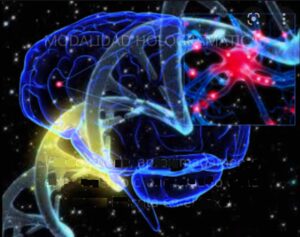 emerged, which differs from decolonization because it penetrates precisely into the dominant thought and epistemology (some authors will call it epistemicide), which is not the simple liberation of domination, but also the resurgence of cultures. subalterns.
emerged, which differs from decolonization because it penetrates precisely into the dominant thought and epistemology (some authors will call it epistemicide), which is not the simple liberation of domination, but also the resurgence of cultures. subalterns.
Thus, authors appeared in Africa (such as Achiles Mbembe), in Latin America (Aníbal Quijano and Rendón Rojas y Morán Reyes), as well as authors of original culture such as indigenous peoples (Davi Kopenawa and Airton Krenak), but a dialogue with European authors is possible. open to this perspective like Peter Sloterdijk (speaks of Europe as the Empire of the Center) and Boaventura Santos (speaks of epistemicide and also some concepts of decolonization), there are many others of course.
Christian culture must also be highlighted in these cultures, seen by many authors as a collaborator of colonialism, one cannot deny the historical perspective and also the doctrine that is the liberation of peoples and a culture of fraternity and solidarity, it is also a minority today in Europe and persecuted in many cases.
Among the Europeans who defend a new humanism, or a humanism in fact, since the Enlightenment and materialist theories failed to contemplate the human soul as a whole, and are therefore a one-legged humanism, among the Europeans I highlight Peter Sloterdijk and Edgar Morin, the first who defends the concept of community as a “protective shield” capable of saving our species, and the second, a planetary humanism, where man is a citizen of the world and diversities are respected.
Both consider the proposals populist, it is good to know that there are left and right, they must lose with the current crisis and global consumerism depends on an atmosphere of “frivolity” or superficiality that humanity will be forced to rethink, we will not go back to that what we consider stable, the original writers themselves, as Davi Krenak highlights in several interviews, what we want to return to was not good, there was no real happiness and well-being in what was considered normal.
As an aspect of the construction of thought, in Sloterdijk I highlight anthropotechnics, for him modernity was a de-verticalization of existence and a de-spiritualization of asceticism, while the knowledge and wisdom proposed in antiquity leave the empirical and the deceptive to go towards the eternal and of the true, as religion does not exist for him, it would be a movement of wisdom and knowledge, and not just an asceticism of exercises, where the immortal soul was exchanged for the body.
In Edgar Morin’s perspective, it is the hologrammatic perspective that can give man a vision of the whole, now fragmented by the specialization and particularity of each branch of science, a paradox of the complex system in which man is a part that must be integrated into the whole, where “not only the part is in the whole, but in which the whole is inscribed in the part”, the pandemic taught us this, but the lesson was still poorly learned, in the middle of the pandemic crisis it was decided that everything is released and there is no protocol for protection of all in each (each part), and there is no co-immunity.
Empathy and spirituality
We did not point out in the previous post that phronesis is not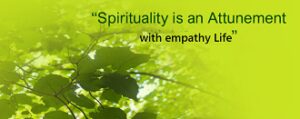 a moral virtue, but an intellectual virtue in Aristotle’s theory, so empathy can be according to the feeling of the phronesis, a better component according to the feeling of the phronesis, the best example to explain this is that of akrasia, or the feeling and phronosis of a psychopath.
a moral virtue, but an intellectual virtue in Aristotle’s theory, so empathy can be according to the feeling of the phronesis, a better component according to the feeling of the phronesis, the best example to explain this is that of akrasia, or the feeling and phronosis of a psychopath.
Although akrasia can be projected literally because it “has no command over itself”, it is described in Plato’s speech in Protagoras, in fact it is a situation of psychopathy where he is aware of a certain actions, but does not have exactly the same a normal person’s feeling towards someone.
Something that is wrong in this counter-argument to explain phronesis is that the desire to alleviate the pain of the other in the face of suffering must be somehow protected, however it does not prevent the psychopath from cultivating some feeling for the other person’s situation and makes of attitudes in the sense of their habits and that are not defined in terms of such we have already said that this comes from thoughts become actions), if we include people who have knowledge or mercy for the suffering of others, then it can be explained.
So it is, therefore, the moral or ethical attitude, although it is, but some attitude of spiritual virtue, that is, the practice of resistance is also only in an action that is not oriented towards a. willingness to act in a moral way that can provide the means to discern about suffering along with Empathy, so one has to expand on that of moral attitudes by Aristotle.
To people who cannot be basic, but can also be able to offer in basic moral virtues, and people who can be basic, but can also be complementary, but can offer a moral virtue, many people who are basic, but who can complement the lack of a virtue. attitude your action, and this is impossible without some exercise in complete to become a habit to feel the Suffering of Others, this exercise that becomes a habit is called here Spirituality.
The phronesis cannot be exercised without basic moral virtues and thus cannot be initiated without empathy, it can be admitted that a psychopath even has empathy, many are charismatic and can influence many people, but he will lack a basic moral virtue that complements your action, and this is impossible without some an exercise to become a habit the full empathic attitude of feeling the suffering of others, this exercise that becomes a habit is called here Spirituality.
While it is not a habit, it can be an exercise in asceticism, a simulation or simply a disguise that at some point will be unveiled.
It is good to point out that there can be asceticism (elevation of the spirit partially) without true spirituality, I call it using Peter Sloterdijk’s term of “despiritualized asceticism”, that is, without a deep root that leads to the broad knowledge of what pain is. of the Other, if we want to give a name to an empathetic phronesis.
Spirituality is, therefore, an exercise that leads to an asceticism, but what is asceticism does not depend only on the belief of each one, but what during life becomes habit and character, those who do not have it can practice it for a long time. a few days, or even a few years, but without deep root it will soon leave it, like losing weight, dieting, diets and other attempts at habits that are not always maintained, to make them life they must integrate our character, our personality.
Empathy and social interaction
Although in some areas such as administration and health there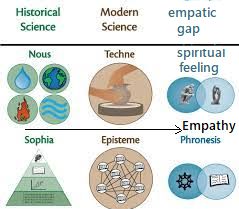 are already works on empathy as an improvement in social relationships, it is far from clear that it is not just an attitude of sympathy, emotional contagion or a caring relationship (Pedersen, 2010), it is not, therefore, a “tactic” of building relationships.
are already works on empathy as an improvement in social relationships, it is far from clear that it is not just an attitude of sympathy, emotional contagion or a caring relationship (Pedersen, 2010), it is not, therefore, a “tactic” of building relationships.
We have already outlined the reasoning that goes from thought to character (Meryl Streep’s phrase in the movie “The Iron Lady”) and must therefore be an exercise in ethical character.
The concept of phronesis (phronesis) translated as “practical wisdom” or “prudence” is developed in Aristotle, in book V of “Ethics to Nicomache”, is this understanding of the empathic and wise being in Aristotle correct? And if so, does being wise in practical matters mean better understanding the phenomenon of empathy?
Along with phronesis in the Nicomachean Ethics are other virtues such as areté (the excellence or supreme virtue) and Aristotle will associate it with five different forms when it comes to human activities, we could say social: the episteme (organized scientific knowledge), the techne (technical knowledge), phronesis (practical wisdom) and sophia (philosophical knowledge) and nous (intellectual “flanks”), of course all these concepts must be contextualized in the contemporary world.
Practical wisdom as Aristotle characterizes it is a kind of knowledge of how to act in practical situations (remember words become actions and actions become habits and define character), but he also speaks of technical expertise, in case that the objective of the activity must have some knowledge beforehand to carry it out, the idea that intuition or inspiration (nous) without technical knowledge is enough is useless.
Empathy is thus a type of discernment, a way of seeing what is happening in the world around us with other human beings, in this sense it is necessary to have wisdom (sophia) and to pay attention to different interpreters who are in a deeper way thematizing itself, maybe the word philosophy is worn out, so just sophia.
Contemporary philosophy Martha Nussbaum has shown how the Aristotelian notion of wisdom rests on understanding emotions as containing knowledge about the world that we share with other people, and phronesis is not devoid of feeling, on the contrary it helps the “sage” to understand and judge the person in a given situation.
Because of the ethical context, we are led to place empathy in the context of Aristotelian moral philosophy, which is a mistake, as phronesis is more appropriate, however, another mistake can happen to consider only as an “intellectual” virtue and disregard subjective aspects (including spiritual ones) that empathy should be placed.
Empathy is then a component of “feeling” related to phronesis, although it is a fact that some philosophers deny that empathy is essentially a feeling (Coplan, Goldie, 2011), we recall again that thoughts become words, these actions and then habits and when inserted in the character are already part of the “feelings”.
We resolved this dispute, it is not that simple, it is true, understanding that while they are not habits they need exercise and then inserted into the character, they are feelings or subjectivities (the subject’s own), but it is clear that it is not a natural attitude, although empathy In other words, “training” is needed.
Thus we detect in Aristotle a gap between practical wisdom and sophia, we would say a healthy spirituality or a capacity for interiorization.
References:
Coplan, A., and P. Goldie. 2011. Introduction. In Empathy: Philosophical and psychological perspectives, ed. A. Coplan, and P. Goldie. Oxford: Oxford University Press.
Pedersen, R. 2010. Empathy in medicine: A philosophical hermeneutic reflection. Oslo: University of Oslo, Faculty of Medicine.
Disempathy or untraining
Of course the term does not exist (disempathy), I created it to say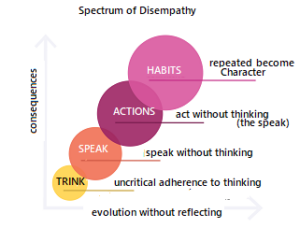 that it is neither antipathy nor disaffection, it is a feeling as great as the empathy that dominates the thoughts, culture and habits of a given time, as opposed to empathy, to develop the theme I take a phrase by Margareth Thatcher quoted in the film The Iron Lady (directed by Phyllida Lloyd, 2011).
that it is neither antipathy nor disaffection, it is a feeling as great as the empathy that dominates the thoughts, culture and habits of a given time, as opposed to empathy, to develop the theme I take a phrase by Margareth Thatcher quoted in the film The Iron Lady (directed by Phyllida Lloyd, 2011).
In the film Margareth Thatcher, played by Meryl Streep (Oscar deserved for best actress) says: “Watch out for your thoughts they become words. Beware that they can become actions, as they become habits. Beware of habits because they become your character”, this to understand how it is possible to detrain neurons so that they are not empathetic and become obnoxious and destructive, unfortunately we are training the opposite side to our natural empathic side.
As we said in the previous post, it is possible to train empathy, it is possible to untrain it (another neologism, something natural that is corrupted by a habit opposite to the instinctive) and induce a feeling of repulsion and hatred, even if disguised or veiled and even disguised in a form of “love” that corrects the other, we must correct everything that is not agape or empathy, but rather, the others are habits or culture.
Let’s follow the path proposed by Thatcher according to the film that intends to be a biography (no, that was the main criticism), so things start with thinking, something must already be corrected right away in contemporary theories and ideologies that say that everything would begin by the “middle”, remember the discourse of contractualists, Thomas Hobbes do Leviathan (1651) indicates that man is wolf the man, that is, he is anti-empathic, whereas John Locke (An Essay Concerning Human Understanding, 1690) defends that the individual must renounce the state of nature and make a contract (which the State regulates) and thus defends its freedom, his famous phrase: “where there is no law, there is no freedom” father of liberalism and in a way of empiricism (I think that it was born embryonic before with the vision of Francis Bacon).
Only Rousseau partly abandoned these concepts creating the “good savage”, the man is good society corrupts him, it is a principle of untraining, but he was also in favor of the contract, so it seems that handing freedom into the hands of the State is a condition “Natural”.
Thus, not only due to contractualism, but throughout the entire historical course, our thinking is linked to its contemporary roots and it is clear to what is within each culture, religion or ideological group, only through reading it is possible to detach from current thinking, and exercise to internalize takes the second step: the words.
Words like that are discourses or, as it is currently said, narratives, which are largely permeated in contemporary culture, only those who read are not linked to the flavor of this culture in its current polarization, remember that the first mental act is imitation (a neuroscience speaks of the mirror neuron), and it can be untrained, that is, it can either be taken back to its natural course of empathy or the opposite of what I have called disempathy.
It is from them that we unleash our actions, much has been said about reflection or active vitta as Hannah Arendt called it, and it was taken up by Byung Chull Han in his book The Society of Burnout, there he argues that we must also have an interior life, reflexive and so we can return to our initial course of empathy (my conclusion).
Finally, actions become habits, a good part of linguistics and semiotics starts the analysis from there, yes it is a fact that it also speaks of secondness (something that exists) and thirdness (what is), Pierce’s categories, but the theme is far and requires a greater depth which I humbly say I do not possess.
We come from habit to character, from the etymology of the word derives from the Greek “charaktér, éros”, or from the Latin “character, eris”, meaning “engraved”, therefore it is what is being carved, and it is possible to become a lack of empathy, that is, a break with the original empathic character, in the current discourse the absence of Subjectivity (proper to the subject), individualism (not looking at the Other) and a series of subcategories that are breaks with empathy.
Empathy: or what it really is
In my humble opinion, because I haven’t seen any of the readings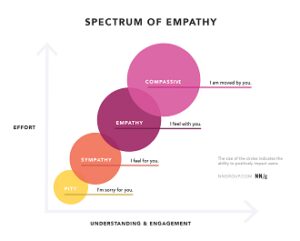 I’ve done to assert this, the word empathy is on the rise because the word Love, in its broad meaning: eros (in the sense Byung Chul Han uses in “The Agony of Eros”), filia (in the sense of the decay of family relationships and friendships) and mainly in the sense of agape, since all the instrumentalization made by modern romantic love, read Balzac’s human comedy, turned into connections, proselytizing or of pure interest.
I’ve done to assert this, the word empathy is on the rise because the word Love, in its broad meaning: eros (in the sense Byung Chul Han uses in “The Agony of Eros”), filia (in the sense of the decay of family relationships and friendships) and mainly in the sense of agape, since all the instrumentalization made by modern romantic love, read Balzac’s human comedy, turned into connections, proselytizing or of pure interest.
Empathy, in a didactic simplification, is the ability to understand the Other as it seems, so it is inseparable from the concept of otherness in the most side of the word.
Empathy escaped these traps, from psychology to philosophy, Husserl studied it and Edith Stein went deeper into neuroscience past using it, in her article in The Atlantic Magazine entitled “A Short History of Empathy”, Susan Lanzoni claims that the word it has existed (in the current sense of course, it has Greek origins) for only a century.
A psychology with empathy I define as having 3 types: a cognitive is an intuitive corn refers to understanding how the other is and feels, an emotional and a compassionate one, it goes without saying that the emotional is also explored as emotional intelligence , the most difficult compassion to intuit is the one that goes beyond understanding and feeling the sensations of the other person, starting to mobilize to help them, but be careful, the help also has to be empathetic, that is, the one that really or other accurate and not any guesswork.
Empathic behavior is known to be natural not only in humans, but in many mammals and some birds as well, and this is actually closer to natural.
Closer because there is a totally induced natural, or consumption, different types of philosophies, theory or even religions that have little or nothing to human nature, and by extension, like nature as a whole, we are a cosmic being, broader than that we think, even though we are a spark in such a vast and mysterious universe.
Every contemporary belief, that seeing the ideas of modernity is that empathy is a new utopia, the realities that come from modern thought have induced the idea that an authoritarian state is needed, even those who deny it dream of it and say it will be “from another like”, essentially the imposition of a model of thought is an affirmation of the ego, it is the inexistence of empathy, it is the antipathy set in motion, just see the polarization this concept becomes clear.
Neuroscience and science itself show that since birth, the maternal and paternal relationship with the baby has an empathic relationship, to live in society an empathetic relationship is needed, an empathic relationship is needed to defend ourselves from the pandemic, without it there is a denial “structural”, that is, the other can die and I cannot.
The theory of neuroscience simulation, through the discovery of mirror neurons (Rizzolatti and Graighero, 2004), a type of neuron that fires when an animal acts when another animal observes and performs the same observed action, so this neuron “mirrors” the behavior of the other, as if the observer himself was acting, this is also observed in some primates and birds, I remember when smoking was allowed in the classroom when, when lighting a cigarette, several students also lit.
This theory has not only advanced neuroscience but has helped the study of some natural phenomena and some types of autism (Distein, Behrmann, 2008).
In addition to being innate, empathy can be trained, this by the most fantastic feature of our brain, which is its plasticity, that is why we are subject to auto-suggestion but also to alter-suggestion, so it could revolutionize the entire theory of self-help for a alter-help in a society focused on empathy, it took several centuries of training (I would say detraining) so that hatred, revenge and the idea that only war can solve (in part) our empathic capacity, since love -agape is in discredit whether it is for excessive labeling without content, or for the formulation of words without corresponding action.
Rizzolatti, Giacomo; Craighero, Laila (2004). “The mirror-neuron system” (PDF). Annual Review of Neuroscience. 27 (1): 169–192.O comportamento empático é conhecido como natural não somente nos seres humanos, mas em outros mamíferos e em algumas aves também.
Dinstein I, Thomas C, Behrmann M, Heeger DJ (2008). “A mirror up to nature”. Curr Biol. 18 (1): R13–8.
Form and act
Information is a strong word at this time in history, however the concept of form of in-form seems to be separate from the concept of matter, hylé for the Greeks.
the concept of form of in-form seems to be separate from the concept of matter, hylé for the Greeks.
Modern philosophy has separated form from content, as well as separating a label from the ingredient in a bottle, but this comes from the reduced understanding of what matter is, the hyle of the Greeks, whose thinking in Aristotelian terminology interconnects them in hylemorphism ( ὕλη, hýle = “matter”; μορφή, morphé = “form”) and in-formation is that.
For this to have an anthropological reach, necessary for the discourse of cultural diversity, it is necessary to link act and potency, as Thomas Aquinas did, where matter is not what we call today (as substance, for example), but what it is as a possibility or in potentiality, written like this by Thomas: “matéria est id quod est in potentia” (matter is what is in potentiality) (THOMÁS, ST I q.3 a.2 c).
Thus the act is the actual existence, or the acting itself, that is, “forma est actus (form is act) (ST I q.50, a.2, obi.3).
Thus, the articulation of the binomials potency x act and matter x form in this way, “matter is nothing but potency, since form is what something is for, as it is the act” (TOMÁS, ScG II, c.43), these categories they give a distinction from fundamental metaphysics, and anthropologically they mean that one thing is the possibility of existing or acting: potency or matter, something else is actually existing or acting: act or form.
Some modern theologies want to separate body and soul, that is, without eschatological and biblical foundation, otherwise the human figure of Jesus would be divided into two: the divine and the human, which would be in opposition and fight against each other, and that is why the Christian anthropology must be strictly unitary, as it is in Thomas Aquinas.
The existence of a body in the human condition is the union between power and act, between matter and form (seen in this new aspect linked to content and essence), without its actual existence (form) the body would not even exist , but only the possibility of existing (potentially) makes it exist in act, this unity is radical, since the necessary condition for its existence is the body. this is fundamental to understand the Christian anthropology written clearly by Thomas: “The human being is not just soul, but something composed of soul and body” (THOMÁS, ST I q. 75 to 4c), if on the one hand all materialism (which is not hylemorphism) denies the existence of the soul, a lot of bad theology seeks to deny the existence of the body, it is the modern dualistic relationship, crystallized in objectivity and subjectivity, in which both are mutilated.
According to Thomas Aquinas, human living bodies and actual existence (form, also called by him the intellective soul) is immortal, unlike other non-human living bodies, whose existence has a beginning and an end, not an eschatological end, but the finalist end of an interruption, for all humans die, and for him death is explained as a temporary deficiency through which we pass into immortal existence and overcome the radical deficiency of the living body through death.
Put more clearly: “That the soul remains after the body, this happens because of a deficiency of the body [per defectum corporis] which is death.
THOMAS AQUINAS. Theological Summa São Paulo: Loyola, 2001-2006. 8 v.
The thinking between simplism and simplicity
Naive thinking ignores the complexity, relief and depth of things see them in the superficiality of their appearance, while simplicity initiates a phenomenological process that begins with the appearance of the beholder and then develops a greater perception, in the words of philosophy, the noema, that complements the initial phase of the ability to feel, the noesis.
see them in the superficiality of their appearance, while simplicity initiates a phenomenological process that begins with the appearance of the beholder and then develops a greater perception, in the words of philosophy, the noema, that complements the initial phase of the ability to feel, the noesis.
By defining complex thinking as having three principles: recursive, dialogic and hologrammatical, Edgar Morin thus explains this third that is inseparable from the other two:
“The hologram is a physical image, conceived by Gabor which, unlike ordinary photographic and filmic images, is projected into space in three dimensions, producing an astonishing sensation of relief and color. The holographed object is restored, in its image, with remarkable fidelity. This hologram is made up of coherent light (laser) and a device that makes each point that constitutes this image contain a sample of the system of interference lines emitted by the points of the holographed object” (MORIN, 2003, p. 34).
To explain and clarify certain phenomena it is necessary to use didactic resources that simplify them, however, this pedagogical task cannot mutilate the explanation nor make it absolutist.
There is nothing more complex than reducing it to the simple, as stated by Bachelard, there is no such thing as simple, there is only the simplified, which in most cases mutilates and deforms the phenomenon, inducing thought to an obscure liquidity.
Phenomena of nature are not easily simplified, often the pretension of mastering it even in scientific cases has revealed a perverse face, this has happened from atomic physics to modern communication technologies, it is necessary to predict and investigate adverse effects.
However, the simplicity of seeing the phenomena does not only depend on the culture, which is always diverse, but on the ability to reduce the idea (the eidetic reduction proposed by Husserl), where we go from simple appearance to the experience of consciousness about what it is informed by the senses and how the mind receives them, interpreting what is informed.
Simplifying always requires an analogy or a metaphor, we’ve already discussed it here, and that yes, it is necessary to be simple to receive “new” information with the disposition of a child, with an epoché, say philosophy, with a suspension of judgment, I would say, Cartesian thought .
MORIN, Edgar et al. (2003> Educar para a era planetaria: o pensamento complex como método parra aprendizagem. (Educating for the planetary era: complex thinking as a method of learning in human error and uncertainty). São Paulo: Editora Cortez.

